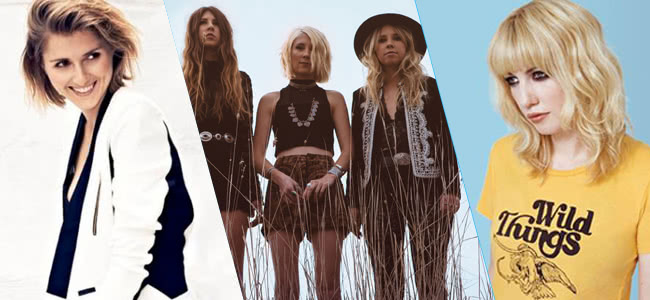As we reported yesterday, the organisers of Canberra’s new Spilt Milk music festival recently issued a response to criticism of their first round lineup after it featured just one female performer amongst 16 total acts.
As we noted, it’s not the first time in recent memory that festival organisers have been criticised for under-representing female acts. The issue of gender parity on music festival lineups has been thrust to the forefront of the industry dialog.
Controversy was stirred after a mock-up of the Leeds and Reading festivals lineup with all of the male acts removed began making the rounds online. At the time, organiser Melvin Benn said he had simply booked the best lineup available.
Indeed, even KLP, who along with fellow triple j alum Nina Las Vegas hit out at the female representation on the Spilt Milk lineup, acknowledges that in many cases promoters have their hands tied when it comes to booking acts and the issue is systemic.
“I think the promoters just don’t think about it and talking about it may make them realise we could represent a more diverse line-up,” she told News Corp. “The more we can make it equal on those stages, the more young girls will see it and think ‘I could do that’.”
“We can’t blame festivals and promoters; it’s everyone in the industry and comes down to labels signing more women and playing more women on the radio.” In a statement, Spilt Milk organisers acknowledged the issue and promised more female acts on their second lineup.
Ironically, Ben Tillman, organiser of boutique Wollongong event Yours and Owls, booked an entirely 50/50 lineup of male and female acts for the festival’s third instalment in October by following the same mantra as Benn and others.
Speaking to News Corp, Tillman said the gender split was not a conscious decision but rather the result of booking available acts whom the organisers all wanted to see. Though he acknowledged last year’s attendance was 55 percent female.
Am I reading this right? 1 female? 😑 The young girl in me is feeling so uninspired to try be a musician in bro-town https://t.co/UIlKWaUlsB
— KLP (@klpmusic) June 9, 2016
lol so backwards https://t.co/18dSmgPvOc
— Nina Las Vegas (@ninalasvegas) June 9, 2016
“Our process is I go out and hunt around for a lineup and come back to everyone with what I’ve got and one of the guys pointed out it was half girls,” Tillman said, reportedly unaware that he’d created possibly the most gender-equal festival in Australia.
“I was just trying to get the best line-up, these were the acts that were available and this is a testament to how much great music there is being made by women. I know a lot of festivals are copping a bit of flak for never having girls on the lineup.”
“I think I will definitely be conscious of it in the future but you don’t want to put constraints on yourself when it comes to choosing acts.” Among other festivals leading the way in female representation is Laneway.
As Tone Deaf reported last year, the 2015 festival featured female acts in more than half of the headlining slots and the majority of Unearthed artists added to the bill were female, though it’s not clear these were intentional choices either.
[include_post id=”481417″]
Katie Noonan, who now curates Queensland Music Festival, told News Corp that festival lineups should be booked based on merit and availability, but should still make room to address gender inequality.
“Festivals are a wonderful opportunity to introduce audiences to a new artist they would not have discovered before,” she said. “I hope to put a lot of bad ass women from Queensland, the rest of Australia and international artists on this festival.”
Noonan and KLP’s manager, Jesse Flavell, agrees: “This is a cultural issue globally but the music industry has a very visible platform from which to address gender equality.”
“The talent is there, more than ever in this country and it’s the role of the gatekeepers in this industry to showcase that amazing talent. The promoters, the music programmers at radio, the labels all need to check themselves because the industry is still largely a boys’ club.”




































